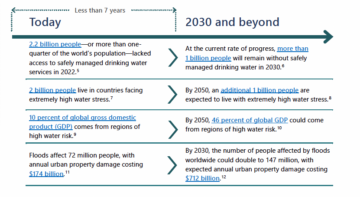
As I write this, I’m fresh off this year’s GreenBiz conference where I participated in two panel discussions on sustainability communications. Amid all the backlash we’ve seen aimed at companies for their social impact programs, and the class-action lawsuits we’ve seen filed over environmental claims, it’s understandable that some companies’ knee-jerk reaction is: “We don’t talk about sustainability!” (Insert the tune to the Disney song “We Don’t Talk About Bruno” here).
But as you’ve heard me mention multiple times here: People WANT to hear from companies about what they’re doing to solve the world’s biggest problems. And if they don’t hear your story about that, they’ll assume you don’t have one, and soon, they won’t want to work for you or buy from you.
So how do you communicate your planet and/or people story without running afoul of the culture police (or actual police)? There’s a two-part principle to follow:
1. If your sustainability story is tied to your business and marketing strategy, there is no backlash.
Now, that doesn’t mean there might not be upset or disagreement with what you’re doing and saying. But if your marketing efforts and communications are tightly aligned with what your company has determined is needed for future growth, then if people are upset, your CEO has a rationale to stick to.
The compare and contrast examples here are Nike and Bud Light (and, full disclosure, Shelton Group was not involved with either client; this is my analysis as a sustainability marcomm outsider looking in). Nike clearly made a strategic business decision to breathe new life into its brand by supporting Colin Kaepernick a few years back. Did people get upset, burn their Nikes and vow never to buy from Nike again? Yes. Did the company’s brand value and sales go up? Yes. When the backlash came, Nike execs stuck firm to the decision and didn’t back down. They knew that the core Nike consumer would be aligned with supporting someone unafraid to stand for something.
People WANT to hear from companies about what they’re doing to solve the world’s biggest problems. And if they don’t hear your story about that, they’ll assume you don’t have one, and soon, they won’t want to work for you or buy from you.
Bud Light’s marketing team, on the other hand, clearly did not make a strategic decision to walk away from conservative young men who want their beer to help them seem macho in favor of focusing exclusively on the LGBTQ community. We know it didn’t make this decision by the way it immediately waffled once they got hit with backlash for supporting a trans influencer. Sadly, its parent company, Anheueser-Busch, has long had a high rating with the Human Rights Campaign’s Corporate Equality Index, the largest LGBTQ advocacy/lobbying organization in the U.S. With Bud Light’s “we didn’t mean to upset anybody” response to the backlash, it ended up alienating both its young male macho target audience AND the LGBTQ target audience.
The moral of the story: Spend the time to ground your sustainability communications efforts in your business and marketing strategy.
2. The connective tissue between your business strategy and your sustainability comms strategy is materiality.
If you conduct a thoughtful, robust materiality analysis, you’ll know exactly what people, planet and governance issues are seen as material to your stakeholders. Then you can set goals and an action plan for addressing those issues. Those goals and plan should and can connect right to your business strategy/plan for growth.
KIND Snacks offers a great example of how this has been done well (and, full disclosure, KIND is a Shelton Group client). Its materiality analysis revealed that almond growing was a material issue for it — because almonds are a key ingredient in KIND bars AND they require a lot of water to grow. Once KIND understood this challenge, it set a goal to have 100 percent of its almonds grown via regenerative agriculture practices on a mass balance basis by 2030. Then it launched a program called the KIND Almond Acres Initiative to begin testing/learning/bringing that goal to life AND bring its stakeholders along on the journey. Here’s a great, on-brand video that tells the story in a way all its audiences can understand:
Did KIND experience some negative comments on social media? Yes. Did it back down or apologize for its efforts to make growing almonds more sustainable? No. It didn’t need to — because, to point No. 1, this program is tied to a goal, which is tied to a material issue, which is tied to its business strategy for growth.
So, as in so many things in life, the answer to how to avoid backlash for telling your sustainability story is NOT to hide your light under a bushel. The answer is to be true to who you really are.
- SEO Powered Content & PR Distribution. Get Amplified Today.
- PlatoData.Network Vertical Generative Ai. Empower Yourself. Access Here.
- PlatoAiStream. Web3 Intelligence. Knowledge Amplified. Access Here.
- PlatoESG. Carbon, CleanTech, Energy, Environment, Solar, Waste Management. Access Here.
- PlatoHealth. Biotech and Clinical Trials Intelligence. Access Here.
- Source: https://www.greenbiz.com/article/how-avoid-backlash-telling-your-sustainability-story
- :has
- :is
- :not
- :where
- $UP
- 1
- 10
- 100
- 2030
- a
- About
- Action
- actual
- addressing
- again
- agriculture
- aimed
- aligned
- All
- along
- Amid
- an
- analysis
- and
- answer
- ARE
- AS
- assume
- At
- audience
- audiences
- avoid
- away
- back
- Balance
- bars
- basis
- BE
- because
- been
- beer
- begin
- between
- Biggest
- both
- brand
- BREATHE
- bring
- burn
- business
- business strategy
- but
- buy
- by
- called
- came
- CAN
- ceo
- challenge
- claims
- clearly
- client
- comments
- communicate
- Communications
- community
- Companies
- company
- Company’s
- compare
- Conduct
- Connect
- conservative
- consumer
- contrast
- Core
- Corporate
- Culture
- decision
- determined
- DID
- disclosure
- discussions
- Disney
- do
- Doesn’t
- doing
- done
- Dont
- down
- efforts
- either
- ended
- environmental
- equality
- exactly
- example
- examples
- exclusively
- Execs
- experience
- favor
- few
- filed
- Firm
- focusing
- follow
- For
- fresh
- from
- full
- future
- future growth
- get
- Go
- goal
- Goals
- got
- governance
- great
- Ground
- Group
- Grow
- Growing
- grown
- Growth
- had
- hand
- Have
- hear
- help
- here
- Hide
- High
- Hit
- How
- How To
- HTML
- HTTPS
- human
- human rights
- i
- if
- immediately
- Impact
- in
- index
- influencer
- ingredient
- Initiative
- into
- involved
- issue
- issues
- IT
- ITS
- journey
- jpg
- Key
- Kind
- knew
- Know
- largest
- launched
- Lawsuits
- LGBTQ
- Life
- light
- Long
- looking
- Lot
- made
- make
- male
- many
- Marketing
- marketing efforts
- marketing strategy
- Mass
- material
- me
- mean
- Media
- Men
- mention
- might
- moral
- more
- multiple
- my
- Need
- needed
- negative
- never
- New
- NIKE
- no
- of
- off
- Offers
- on
- once
- ONE
- or
- organization
- Other
- over
- panel
- panel discussions
- parent company
- participated
- People
- percent
- plan
- planet
- plato
- Plato Data Intelligence
- PlatoData
- Point
- Police
- practices
- principle
- problems
- Program
- Programs
- rating
- rationale
- reaction
- really
- regenerative
- Regenerative Agriculture
- require
- response
- Revealed
- right
- rights
- robust
- running
- s
- sadly
- sales
- saying
- seem
- seen
- set
- should
- snacks
- So
- Social
- Social impact
- social media
- SOLVE
- some
- Someone
- something
- song
- Soon
- spend
- stakeholders
- stand
- Stick
- Story
- Strategic
- strategic business
- Strategy
- stuck
- Supporting
- Sustainability
- sustainable
- Talk
- Target
- team
- telling
- tells
- that
- The
- their
- Them
- then
- There.
- they
- things
- this
- those
- Tied
- tightly
- time
- times
- tissue
- to
- trans
- true
- tune
- two
- u.s.
- under
- understand
- understandable
- understood
- value
- via
- Video
- walk
- want
- was
- Water
- Way..
- we
- WELL
- What
- when
- which
- WHO
- with
- without
- Work
- world’s
- would
- write
- years
- yes
- you
- young
- Your
- zephyrnet









